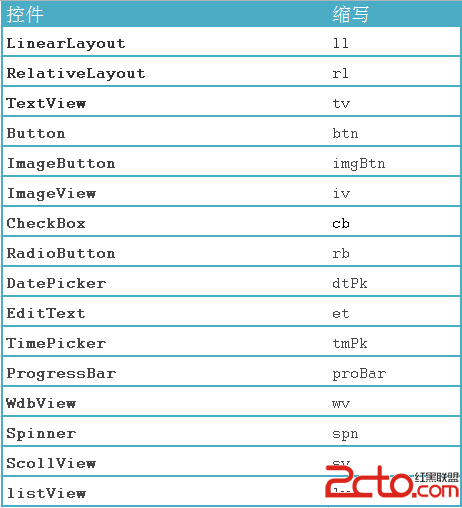編輯:關於Android編程
developer.android.com 文檔中有一篇關於性能的文章,裡面提到了內部類的使用。文章建議“對於私有內部類 使用 包訪問權限代替私有權限訪問”,
這裡說的是在內部類訪問外部類的成員或方法時如果 內部類是私有的並且外部類的成員也是私有的,那麼編譯器就會為內部類在外部類中增加一個靜態方法。
真的是這樣的嗎?只有試一試才知道。
我們使用一個簡單的例子來測試下:
public class One {
private int a;
private class B{
public int getA(){
return a;
}
}
}導出的結果如下:
Processing 'one.dex'...
Opened 'one.dex', DEX version '035'
Class #0 -
Class descriptor : 'LOne$B;'
Access flags : 0x0000 ()
Superclass : 'Ljava/lang/Object;'
Interfaces -
Static fields -
Instance fields -
#0 : (in LOne$B;)
name : 'this$0'
type : 'LOne;'
access : 0x1010 (FINAL SYNTHETIC)
Direct methods -
#0 : (in LOne$B;)
name : ''
type : '(LOne;)V'
access : 0x10002 (PRIVATE CONSTRUCTOR)
code -
registers : 2
ins : 2
outs : 1
insns size : 6 16-bit code units
0001a0: |[0001a0] One.B.:(LOne;)V
0001b0: 5b01 0000 |0000: iput-object v1, v0, LOne$B;.this$0:LOne; // field@0000
0001b4: 7010 0400 0000 |0002: invoke-direct {v0}, Ljava/lang/Object;.:()V // method@0004
0001ba: 0e00 |0005: return-void
catches : (none)
positions :
0x0000 line=7
locals :
0x0000 - 0x0006 reg=0 this LOne$B;
Virtual methods -
#0 : (in LOne$B;)
name : 'getA'
type : '()I'
access : 0x0001 (PUBLIC)
code -
registers : 2
ins : 1
outs : 1
insns size : 7 16-bit code units
0001bc: |[0001bc] One.B.getA:()I
0001cc: 5410 0000 |0000: iget-object v0, v1, LOne$B;.this$0:LOne; // field@0000
0001d0: 7110 0300 0000 |0002: invoke-static {v0}, LOne;.access$0:(LOne;)I // method@0003
0001d6: 0a00 |0005: move-result v0
0001d8: 0f00 |0006: return v0
catches : (none)
positions :
0x0000 line=10
locals :
0x0000 - 0x0007 reg=1 this LOne$B;
source_file_idx : 10 (One.java)
Class #1 -
Class descriptor : 'LOne;'
Access flags : 0x0001 (PUBLIC)
Superclass : 'Ljava/lang/Object;'
Interfaces -
Static fields -
Instance fields -
#0 : (in LOne;)
name : 'a'
type : 'I'
access : 0x0002 (PRIVATE)
Direct methods -
#0 : (in LOne;)
name : ''
type : '()V'
access : 0x10001 (PUBLIC CONSTRUCTOR)
code -
registers : 1
ins : 1
outs : 1
insns size : 4 16-bit code units
0001dc: |[0001dc] One.:()V
0001ec: 7010 0400 0000 |0000: invoke-direct {v0}, Ljava/lang/Object;.:()V // method@0004
0001f2: 0e00 |0003: return-void
catches : (none)
positions :
0x0000 line=3
locals :
0x0000 - 0x0004 reg=0 this LOne;
#1 : (in LOne;)
name : 'access$0'
type : '(LOne;)I'
access : 0x1008 (STATIC SYNTHETIC)
code -
registers : 2
ins : 1
outs : 0
insns size : 3 16-bit code units
0001f4: |[0001f4] One.access$0:(LOne;)I
000204: 5210 0100 |0000: iget v0, v1, LOne;.a:I // field@0001
000208: 0f00 |0002: return v0
catches : (none)
positions :
0x0000 line=5
locals :
Virtual methods -
source_file_idx : 10 (One.java)
One.access$0:(LOne;)I
現在我們把源碼改下
public class One {
private int a;
class B{
public int getA(){
return a;
}
}
}
Processing 'one.dex'...
Opened 'one.dex', DEX version '035'
Class #0 -
Class descriptor : 'LOne$B;'
Access flags : 0x0000 ()
Superclass : 'Ljava/lang/Object;'
Interfaces -
Static fields -
Instance fields -
#0 : (in LOne$B;)
name : 'this$0'
type : 'LOne;'
access : 0x1010 (FINAL SYNTHETIC)
Direct methods -
#0 : (in LOne$B;)
name : ''
type : '(LOne;)V'
access : 0x10000 (CONSTRUCTOR)
code -
registers : 2
ins : 2
outs : 1
insns size : 6 16-bit code units
0001a0: |[0001a0] One.B.:(LOne;)V
0001b0: 5b01 0000 |0000: iput-object v1, v0, LOne$B;.this$0:LOne; // field@0000
0001b4: 7010 0400 0000 |0002: invoke-direct {v0}, Ljava/lang/Object;.:()V // method@0004
0001ba: 0e00 |0005: return-void
catches : (none)
positions :
0x0000 line=7
locals :
0x0000 - 0x0006 reg=0 this LOne$B;
Virtual methods -
#0 : (in LOne$B;)
name : 'getA'
type : '()I'
access : 0x0001 (PUBLIC)
code -
registers : 2
ins : 1
outs : 1
insns size : 7 16-bit code units
0001bc: |[0001bc] One.B.getA:()I
0001cc: 5410 0000 |0000: iget-object v0, v1, LOne$B;.this$0:LOne; // field@0000
0001d0: 7110 0300 0000 |0002: invoke-static {v0}, LOne;.access$0:(LOne;)I // method@0003
0001d6: 0a00 |0005: move-result v0
0001d8: 0f00 |0006: return v0
catches : (none)
positions :
0x0000 line=10
locals :
0x0000 - 0x0007 reg=1 this LOne$B;
source_file_idx : 10 (One.java)
Class #1 -
Class descriptor : 'LOne;'
Access flags : 0x0001 (PUBLIC)
Superclass : 'Ljava/lang/Object;'
Interfaces -
Static fields -
Instance fields -
#0 : (in LOne;)
name : 'a'
type : 'I'
access : 0x0002 (PRIVATE)
Direct methods -
#0 : (in LOne;)
name : ''
type : '()V'
access : 0x10001 (PUBLIC CONSTRUCTOR)
code -
registers : 1
ins : 1
outs : 1
insns size : 4 16-bit code units
0001dc: |[0001dc] One.:()V
0001ec: 7010 0400 0000 |0000: invoke-direct {v0}, Ljava/lang/Object;.:()V // method@0004
0001f2: 0e00 |0003: return-void
catches : (none)
positions :
0x0000 line=3
locals :
0x0000 - 0x0004 reg=0 this LOne;
#1 : (in LOne;)
name : 'access$0'
type : '(LOne;)I'
access : 0x1008 (STATIC SYNTHETIC)
code -
registers : 2
ins : 1
outs : 0
insns size : 3 16-bit code units
0001f4: |[0001f4] One.access$0:(LOne;)I
000204: 5210 0100 |0000: iget v0, v1, LOne;.a:I // field@0001
000208: 0f00 |0002: return v0
catches : (none)
positions :
0x0000 line=5
locals :
Virtual methods -
source_file_idx : 10 (One.java)
依然有附加的方法One.access$0:(LOne;)I
public class One {
int a;
class B{
public int getA(){
return a;
}
}
}
Processing 'one.dex'...
Opened 'one.dex', DEX version '035'
Class #0 -
Class descriptor : 'LOne$B;'
Access flags : 0x0000 ()
Superclass : 'Ljava/lang/Object;'
Interfaces -
Static fields -
Instance fields -
#0 : (in LOne$B;)
name : 'this$0'
type : 'LOne;'
access : 0x1010 (FINAL SYNTHETIC)
Direct methods -
#0 : (in LOne$B;)
name : ''
type : '(LOne;)V'
access : 0x10000 (CONSTRUCTOR)
code -
registers : 2
ins : 2
outs : 1
insns size : 6 16-bit code units
000184: |[000184] One.B.:(LOne;)V
000194: 5b01 0000 |0000: iput-object v1, v0, LOne$B;.this$0:LOne; // field@0000
000198: 7010 0300 0000 |0002: invoke-direct {v0}, Ljava/lang/Object;.:()V // method@0003
00019e: 0e00 |0005: return-void
catches : (none)
positions :
0x0000 line=7
locals :
0x0000 - 0x0006 reg=0 this LOne$B;
Virtual methods -
#0 : (in LOne$B;)
name : 'getA'
type : '()I'
access : 0x0001 (PUBLIC)
code -
registers : 2
ins : 1
outs : 0
insns size : 5 16-bit code units
0001a0: |[0001a0] One.B.getA:()I
0001b0: 5410 0000 |0000: iget-object v0, v1, LOne$B;.this$0:LOne; // field@0000
0001b4: 5200 0100 |0002: iget v0, v0, LOne;.a:I // field@0001
0001b8: 0f00 |0004: return v0
catches : (none)
positions :
0x0000 line=10
locals :
0x0000 - 0x0005 reg=1 this LOne$B;
source_file_idx : 9 (One.java)
Class #1 -
Class descriptor : 'LOne;'
Access flags : 0x0001 (PUBLIC)
Superclass : 'Ljava/lang/Object;'
Interfaces -
Static fields -
Instance fields -
#0 : (in LOne;)
name : 'a'
type : 'I'
access : 0x0000 ()
Direct methods -
#0 : (in LOne;)
name : ''
type : '()V'
access : 0x10001 (PUBLIC CONSTRUCTOR)
code -
registers : 1
ins : 1
outs : 1
insns size : 4 16-bit code units
0001bc: |[0001bc] One.:()V
0001cc: 7010 0300 0000 |0000: invoke-direct {v0}, Ljava/lang/Object;.:()V // method@0003
0001d2: 0e00 |0003: return-void
catches : (none)
positions :
0x0000 line=3
locals :
0x0000 - 0x0004 reg=0 this LOne;
Virtual methods -
source_file_idx : 9 (One.java)
如果外部類的成員是包訪問的,內部類是私有的同樣也不會產生附加的方法。
內部類對外部類成員的訪問是不能直接訪問私有成員的,編譯器會增加額外的輔助方法,避免的方法是修改外部類的成員為包訪問,文檔中也提到了這會在一定程度上破壞
封裝。
 最佳實踐之 Android代碼規范
最佳實踐之 Android代碼規范
命名規范包命名規范采用反域名命名規則,包名全部小寫,連續的單詞只是簡單地連接起來,不使用下劃線,一級包名為com,二級包名為xxx(可以是公司域名或者個人命名),三級包名
 Android下拉刷新官方版
Android下拉刷新官方版
網上關於下拉刷新的文章也不少,不過都太長了。恰好發現了官方的下拉刷新庫,而且效果還是不錯的,簡潔美觀,用得也挺方便。下面是效果圖:我的好友原來是空的,刷新後多了兩個。使用
 我們為什麼要在Android中使用RxJava
我們為什麼要在Android中使用RxJava
感覺RxJava最近風生水起,不學習一下都不好意思了,灑家也是初學RxJava,也是感覺代碼好像更復雜更難懂了,看了一篇外文感同身受,簡單翻譯一下。本文簡單介紹使用Rx
 android開發使用SQLite之寫日記
android開發使用SQLite之寫日記
使用數據庫實現對數據的存儲。 下面上一個小例子,寫日記。 效果如下: 當LIstView中沒有數據顯示時,我們需要告訴用戶沒有數據.